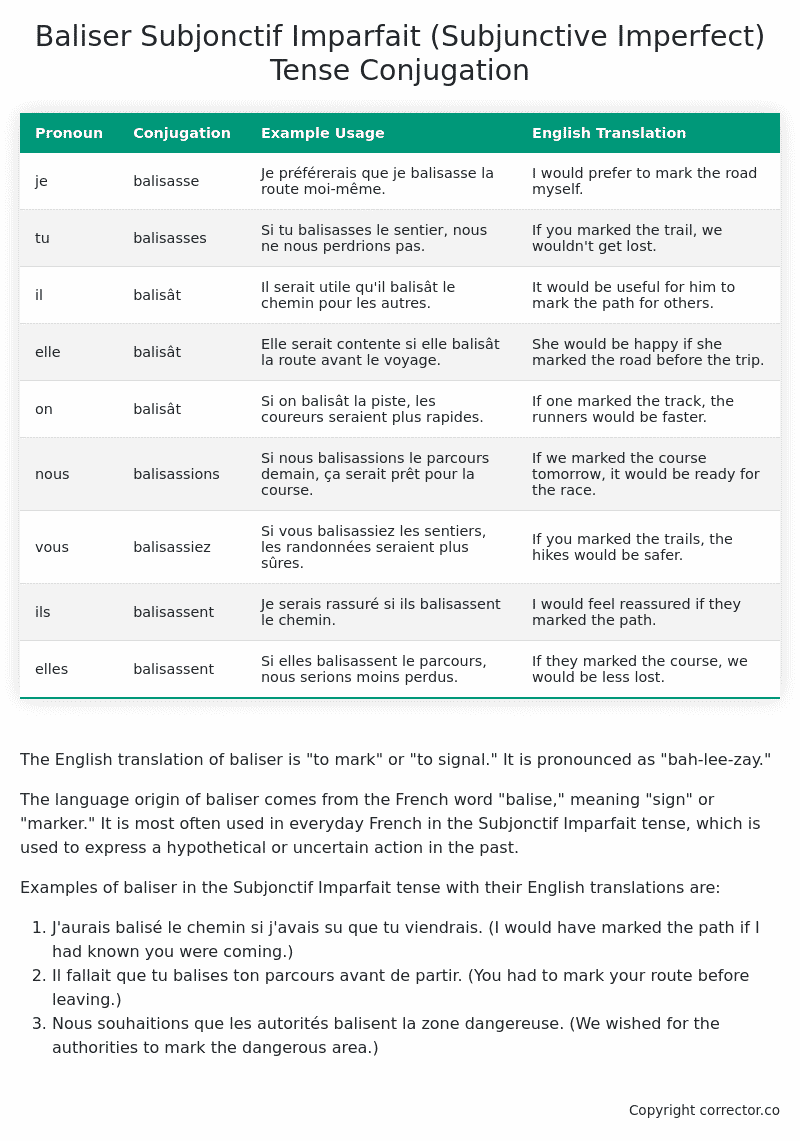Subjonctif Imparfait (Subjunctive Imperfect) Tense Conjugation of the French Verb baliser
Introduction to the verb baliser
The English translation of baliser is “to mark” or “to signal.” It is pronounced as “bah-lee-zay.”
The language origin of baliser comes from the French word “balise,” meaning “sign” or “marker.” It is most often used in everyday French in the Subjonctif Imparfait tense, which is used to express a hypothetical or uncertain action in the past.
Examples of baliser in the Subjonctif Imparfait tense with their English translations are:
- J’aurais balisé le chemin si j’avais su que tu viendrais. (I would have marked the path if I had known you were coming.)
- Il fallait que tu balises ton parcours avant de partir. (You had to mark your route before leaving.)
- Nous souhaitions que les autorités balisent la zone dangereuse. (We wished for the authorities to mark the dangerous area.)
Table of the Subjonctif Imparfait (Subjunctive Imperfect) Tense Conjugation of baliser
| Pronoun | Conjugation | Example Usage | English Translation |
|---|---|---|---|
| je | balisasse | Je préférerais que je balisasse la route moi-même. | I would prefer to mark the road myself. |
| tu | balisasses | Si tu balisasses le sentier, nous ne nous perdrions pas. | If you marked the trail, we wouldn’t get lost. |
| il | balisât | Il serait utile qu’il balisât le chemin pour les autres. | It would be useful for him to mark the path for others. |
| elle | balisât | Elle serait contente si elle balisât la route avant le voyage. | She would be happy if she marked the road before the trip. |
| on | balisât | Si on balisât la piste, les coureurs seraient plus rapides. | If one marked the track, the runners would be faster. |
| nous | balisassions | Si nous balisassions le parcours demain, ça serait prêt pour la course. | If we marked the course tomorrow, it would be ready for the race. |
| vous | balisassiez | Si vous balisassiez les sentiers, les randonnées seraient plus sûres. | If you marked the trails, the hikes would be safer. |
| ils | balisassent | Je serais rassuré si ils balisassent le chemin. | I would feel reassured if they marked the path. |
| elles | balisassent | Si elles balisassent le parcours, nous serions moins perdus. | If they marked the course, we would be less lost. |
Other Conjugations for Baliser.
Le Present (Present Tense) Conjugation of the French Verb baliser
Imparfait (Imperfect) Tense Conjugation of the French Verb baliser
Passé Simple (Simple Past) Tense Conjugation of the French Verb baliser
Passé Composé (Present Perfect) Tense Conjugation of the French Verb baliser
Futur Simple (Simple Future) Tense Conjugation of the French Verb baliser
Futur Proche (Near Future) Tense Conjugation of the French Verb baliser
Plus-que-parfait (Pluperfect) Tense Conjugation of the French Verb baliser
Passé Antérieur (Past Anterior) Tense Conjugation of the French Verb baliser
Futur Antérieur (Future Anterior) Tense Conjugation of the French Verb baliser
Subjonctif Présent (Subjunctive Present) Tense Conjugation of the French Verb baliser
Subjonctif Passé (Subjunctive Past) Tense Conjugation of the French Verb baliser
Subjonctif Imparfait (Subjunctive Imperfect) Tense Conjugation of the French Verb baliser (this article)
Subjonctif Plus-que-parfait (Subjunctive Pluperfect) Tense Conjugation of the French Verb baliser
Conditionnel Présent (Conditional Present) Tense Conjugation of the French Verb baliser
Conditionnel Passé (Conditional Past) Tense Conjugation of the French Verb baliser
L’impératif Présent (Imperative Present) Tense Conjugation of the French Verb baliser
L’infinitif Présent (Infinitive Present) Tense Conjugation of the French Verb baliser
Struggling with French verbs or the language in general? Why not use our free French Grammar Checker – no registration required!
Get a FREE Download Study Sheet of this Conjugation 🔥
Simply right click the image below, click “save image” and get your free reference for the baliser Subjonctif Imparfait tense conjugation!

Baliser – About the French Subjonctif Imparfait (Subjunctive Imperfect) Tense
Formation
Common Everyday Usage Patterns
Interactions with Other Tenses
Subjonctif Présent
Indicatif Passé Composé
Conditional
Conditional Perfect
Summary
I hope you enjoyed this article on the verb baliser. Still in a learning mood? Check out another TOTALLY random French verb conjugation!


